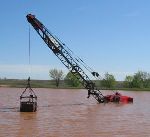After the Deluge
As the cleaning up continues in Queensland and Victoria after the devastating floods in January, the ongoing financial impact is starting to become apparent. 
- Three-quarters of Queensland’s coalmines have been inundated and many of Queensland’s largest coal exporters have invoked “force majeure” clauses in their contracts, which allow them to delay deliveries as a result of “circumstances beyond their control”. The extent to which companies can rely on those clauses depends very much on their wording, and a partner of Mallesons Stephens Jacques has warned that courts will usually require companies to make deliveries by an alternative route, even if it costs more than originally budgeted. It has been estimated that coalmines are losing $100 million a day as a result of the floods. The impact of lost production may be offset to some extent because shortages push up prices.
- Railway lines have been submerged by mud; others have been torn up by the floodwaters and tangled into knots or buried under landslides. Bridges have been undermined, as have railway tracks. There was an initial estimate of a $27 million hit to the profit forecasts of Queensland Rail but it could be much more than that – the effect will only become clear when the first full-year figures are available.
- Infrastructure damage could be as much as $20 billion. The Local Government Association of Queensland estimates that up to 90,000 km of council roads have been ripped up by floodwaters. Mobile phone towers have been destroyed, electrical and phone lines have been cut, electrical power poles have been ripped out of the ground, and sewerage systems have been submerged. In addition, much public transport infrastructure, including ferry terminals on the Brisbane River, has simply been washed away and needs to be rebuilt.
- All kinds of debris from the floods, including huge chunks of concrete, floating shipping containers, cars, trucks and trailers, wharves, and riverside walkways, have been washed into the ocean and will be hazardous for ships in many areas for at least the foreseeable future. Minesweepers are already at work but will be required for some time.
- Many householders and business people who have lost their properties and sustained damage in the floods are not covered by insurance because of “confusing definitions” in many insurance policies, a survey by leading consumer group Choice has found. Apparently only 30% of policies available nationwide cover “riverine flooding” – that is, flood resulting from rising river levels.
- It is estimated that the sugar industry in Queensland has sustained $500 million in direct losses for the 2010 season as a result of the floods. Potential damage for the 2011 season cannot yet be estimated, but crop damage, poor growing conditions, loss of plantation area and lack of fertilisers and pesticides will severely affect sugar production this year.
- According to the National Australia Bank, cotton production estimates have been cut by about 10% or 400,000 bales as a result of the floods.
- Beef exports are likely to be affected by the floods, although to what extent will not become clear until the waters recede and mustering commences. Modern cattle-tagging technology will help cattle growers to identify missing or drowned livestock.
- Anticipated lower company profits, wages, stamp duty, payroll tax and mining royalties will affect state and federal government budgets.
- Bad debts are likely to increase and borrowers could default in significant numbers. Borrowing costs could rise and profits for Queensland-based institutions such as the Bank of Queensland and Suncorp are likely to be downgraded in the aftermath of the flood.
- There will be a severe skills shortage as a result of floods. Tradesmen, labourers, and mining and agricultural workers will be in high demand as Queensland rebuilds homes and businesses. Skilled workers such as IT technicians and bookkeepers will also be in high demand as businesses try to recover lost business records.
- Retailers will likely benefit from replacement sales of household electrical items, carpets, furniture and cars.
The overall economic impact of the floods has been estimated to be a quarter to a half per cent of Gross Domestic Product.
The impact on human lives and the ongoing emotional damage is immeasurable.
